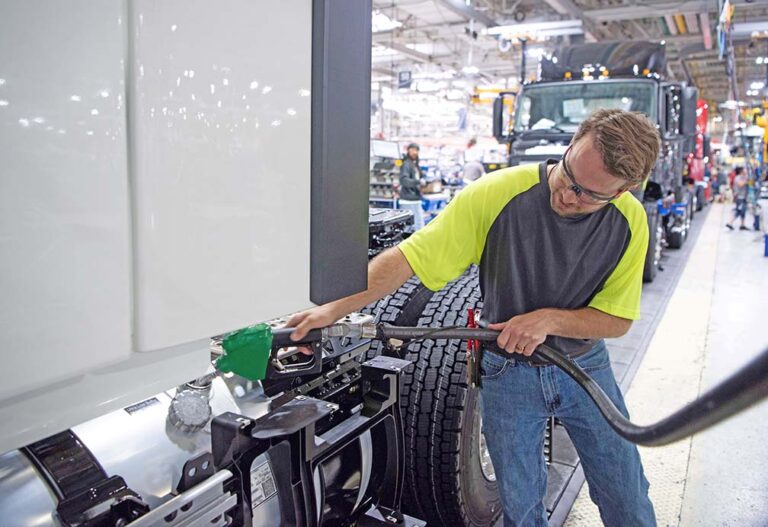GREENSBORO, N.C. — Volvo Trucks North America is fueling newly assembled trucks with hydrotreated vegetable oil (HVO), a renewable fuel, as they depart from the Volvo Trucks New River Valley Assembly Operations (NRV) in Dublin, Virginia.
All Volvo trucks for the North American market are produced at the NRV plant, including the all-new Volvo VNL, which will begin production later this summer, according to a news release.
This initiative, Volvo officials say, is part of the company’s broader strategy to decarbonize the trucking industry.
“Today and for the foreseeable future there will not be a one-size fits all approach to decarbonizing transportation,” said Peter Voorhoeve, president, Volvo Trucks North America. “That is why, at Volvo Trucks, we are focused on the three-pillar strategy with battery electric, hydrogen fuel cell and renewable fuels in the internal combustion engine. With the all-new Volvo VNL and by utilizing HVO, we can make the most substantial and immediate impact today. There is a future for the ICE and we’re happy to be doing all factory fills with renewable fuel, an important step towards walking the talk in our sustainability journey.”
HVO is a renewable fuel that can be used in the same engine as fossil-based diesel without requiring engine modifications.
Produced from renewable sources such as waste vegetable oils and animal fats, HVO has the same chemical structure as fossil-based diesel so it can be used as a direct replacement to reduce greenhouse gas emissions while maintaining engine performance.
By utilizing these waste products as feedstocks, HVO production can promote a more sustainable circular economy by converting waste into valuable fuel, according to Volvo.
Unlike first-generation biofuels, these raw sources are processed using hydrotreatment to achieve high levels of purity, allowing HVO to be stored, used, pumped and handled virtually the same way as fossil-based diesel products.
Because HVO is hydrogenated, it doesn’t contain oxygen and does not present the challenges of first-generation biofuels, including biodiesel, relating to extreme temperature and storage.
“This is an added benefit of HVO as it does not require separate storage or fueling infrastructure,” the news release states. “HVO, often referred to as renewable diesel, can be used interchangeably with petroleum diesel. Renewable diesel at any blend up to a maximum of 100% (RD100) that conforms to ASTM D975 or EN15940 will not adversely affect engine or aftertreatment performance or durability.”
Volvo Trucks is fueling new trucks leaving the NRV plant with 20 to 25 gallons of HVO per tank, with full tanks provided for trucks destined directly to customers. This initiative is expected to replace 1,125,000 gallons of fossil-based diesel annually, achieving an estimated 75% to 85% reduction in CO2 emissions for Volvo Trucks’ operations in North America.
“The internal combustion engine has more than 100 years of research and development and established support in the industry. It must be part of the decarbonization journey and major, immediate decarbonization possibilities exist by using renewable fuels, including HVO and hydrogen,” said Johan Agebrand, director of product marketing at Volvo Trucks North America. “Volvo Trucks continues to work with the industry to broaden the use of renewable fuels. Fuels produced using hydrotreatment process such as, HVO and RD100, can be interchangeable with diesel and is a viable fuel to decarbonize transportation truck operators can start using today.”
Born in Pine Bluff, Arkansas, and raised in East Texas, John Worthen returned to his home state to attend college in 1998 and decided to make his life in The Natural State. Worthen is a 20-year veteran of the journalism industry and has covered just about every topic there is. He has a passion for writing and telling stories. He has worked as a beat reporter and bureau chief for a statewide newspaper and as managing editor of a regional newspaper in Arkansas. Additionally, Worthen has been a prolific freelance journalist for two decades, and has been published in several travel magazines and on travel websites.








DIESELS will run on straight oil but its a lot higher then fuel same with vegetable oil , so how much did it cost and time to figure this one out
Where is this new fuel being made? Or used. Does it clog up filters as bad as biodiesel?? Very interested in this. As diesel fuel prices still climbing